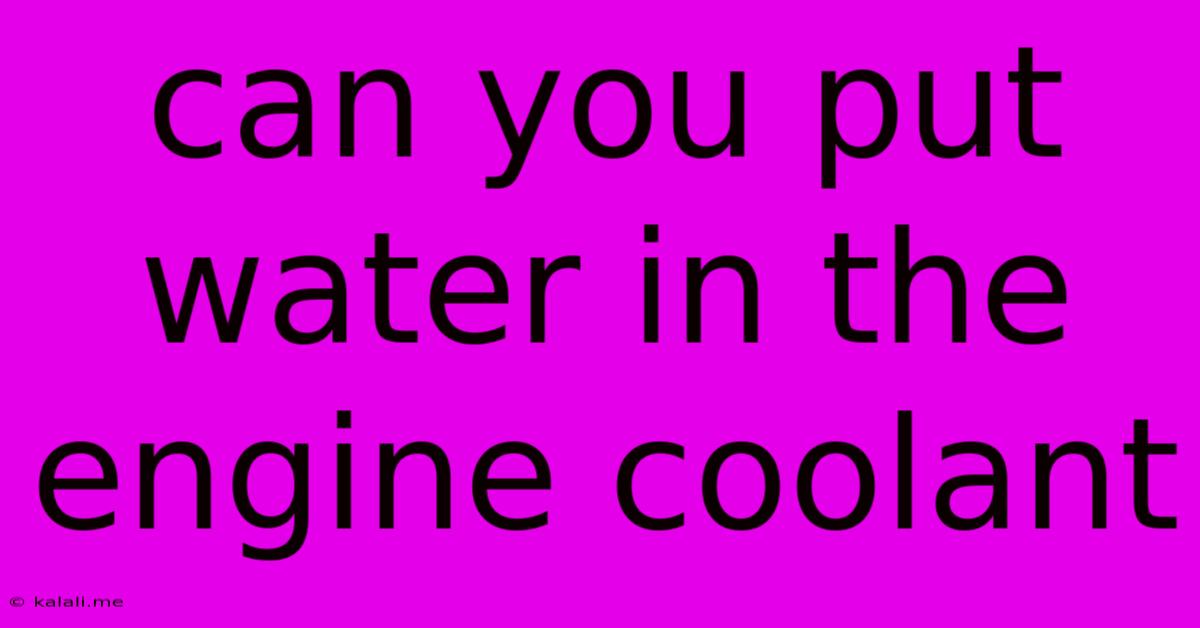Can You Put Water In The Engine Coolant
Kalali
May 19, 2025 · 3 min read

Table of Contents
Can You Put Water in the Engine Coolant? A Definitive Guide
Meta Description: Is it okay to add water to your engine coolant? This comprehensive guide explores the pros, cons, and potential risks of mixing water and coolant, helping you make informed decisions about your vehicle's cooling system. Learn about the best practices for maintaining your car's coolant levels and preventing costly repairs.
Adding water to your engine coolant might seem like a simple solution to a low coolant level, especially in an emergency. However, while it might seem harmless, it's a decision that should be made with caution. This article delves into the complexities of mixing water and coolant, outlining the potential benefits and significant drawbacks.
Understanding the Role of Engine Coolant
Before we explore the implications of adding water, let's understand the vital role of engine coolant. Engine coolant, also known as antifreeze, is a crucial component of your vehicle's cooling system. It's a mixture of water and antifreeze chemicals (typically ethylene glycol or propylene glycol) designed to:
- Prevent overheating: Coolant absorbs heat generated by the engine and transfers it to the radiator for dissipation.
- Prevent freezing: The antifreeze component lowers the freezing point of the mixture, protecting the engine block from damage in cold weather.
- Prevent corrosion: Coolant contains corrosion inhibitors that safeguard vital engine components from rust and degradation.
- Lubricate the water pump: The coolant helps lubricate the water pump seals, ensuring smooth operation.
The Risks of Using Only Water
While water can temporarily cool the engine, using it as a long-term replacement for coolant is strongly discouraged. Here's why:
- Corrosion: Water lacks the corrosion inhibitors found in coolant, leading to rust and scale buildup within the engine block, radiator, and other components. This can severely reduce engine lifespan and lead to expensive repairs.
- Freezing: Water freezes at 0°C (32°F), causing significant damage to the engine block and other components if exposed to freezing temperatures. Cracked engine blocks are a common consequence.
- Overheating: Water alone has a lower boiling point than coolant, increasing the risk of overheating, especially in hot climates or during strenuous driving. This can lead to warped cylinder heads, blown head gaskets, and other major engine failures.
- Lack of lubrication: Water doesn't offer the same lubricating properties as coolant, potentially damaging the water pump seals.
When is it Acceptable to Add Water to Coolant?
There are very limited circumstances where adding a small amount of water might be considered a temporary emergency measure:
- Absolute Emergency: If you're stranded with a critically low coolant level and absolutely no access to coolant, adding clean water to get to a repair shop or parts store might be necessary. However, this should only be a temporary fix.
- Distilled Water is Key: If you must add water, use distilled water, not tap water. Tap water contains minerals that can contribute to corrosion and scale buildup.
Crucially, this should be a last resort, and you must replace the mixture with proper coolant as soon as possible.
Best Practices for Coolant Maintenance
Preventing low coolant levels is always preferable to dealing with an emergency. Here are some best practices:
- Regular Inspections: Regularly check your coolant level using the reservoir tank.
- Scheduled Coolant Changes: Follow the manufacturer's recommended coolant change intervals.
- Professional Flushing: Consider professional coolant flushes and replacements at regular intervals to remove old coolant, debris, and buildup.
- Addressing Leaks: If you consistently notice low coolant levels, address any leaks promptly.
In conclusion, while adding water to engine coolant might seem like a quick fix, the long-term consequences can be severe and costly. Always prioritize using the correct coolant mixture for your vehicle and maintain regular inspections to prevent low coolant levels. Using distilled water in a true emergency is acceptable, but replacing it with proper coolant should be done immediately. Regular maintenance and addressing issues promptly are crucial for ensuring the health and longevity of your vehicle's cooling system.
Latest Posts
Latest Posts
-
Is 2 The Only Even Prime Number
May 19, 2025
-
Is Rubbing Alcohol The Same As White Spirit
May 19, 2025
-
How Long Does It Take To Restore Icloud
May 19, 2025
-
On A Bus Or In A Bus
May 19, 2025
-
Spanish For Can I Have The Bill
May 19, 2025
Related Post
Thank you for visiting our website which covers about Can You Put Water In The Engine Coolant . We hope the information provided has been useful to you. Feel free to contact us if you have any questions or need further assistance. See you next time and don't miss to bookmark.